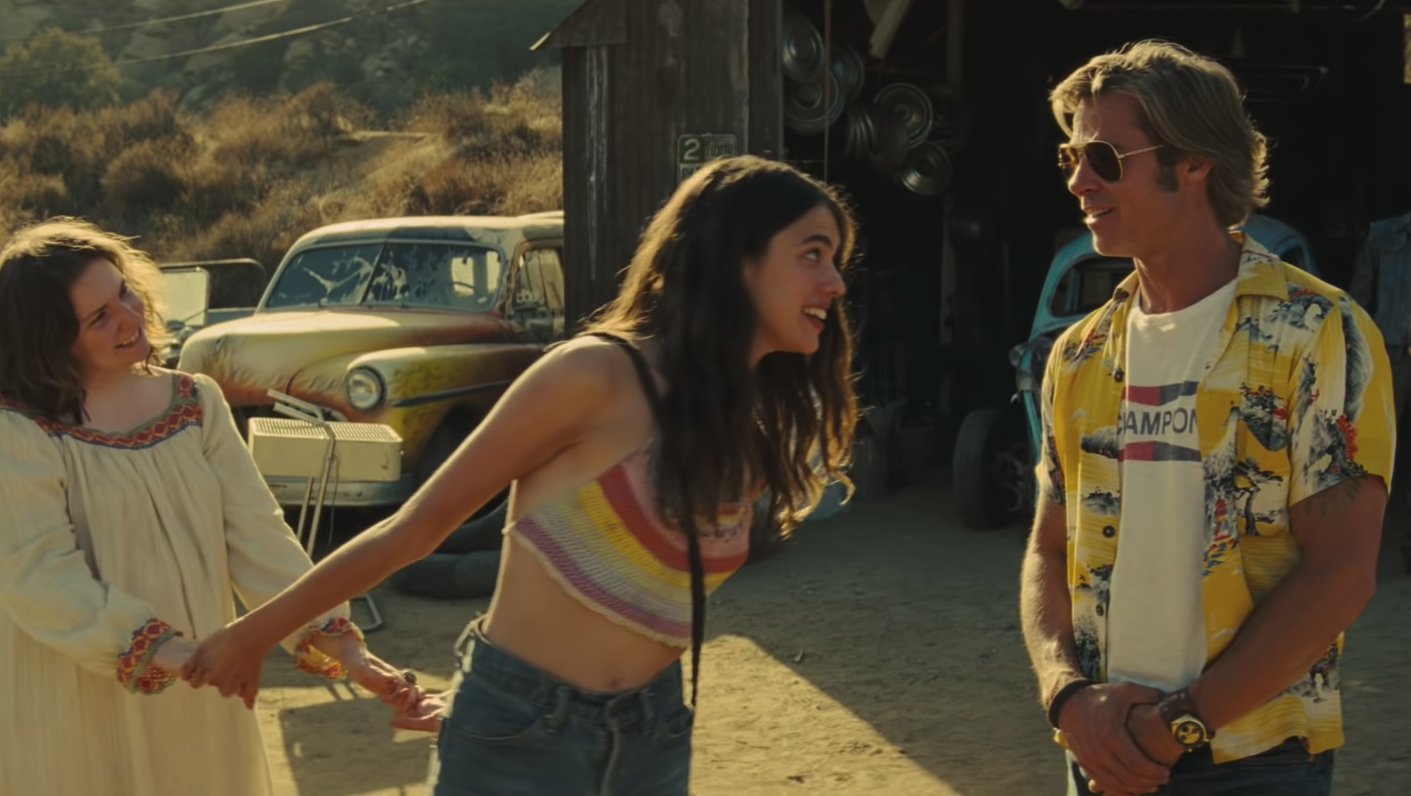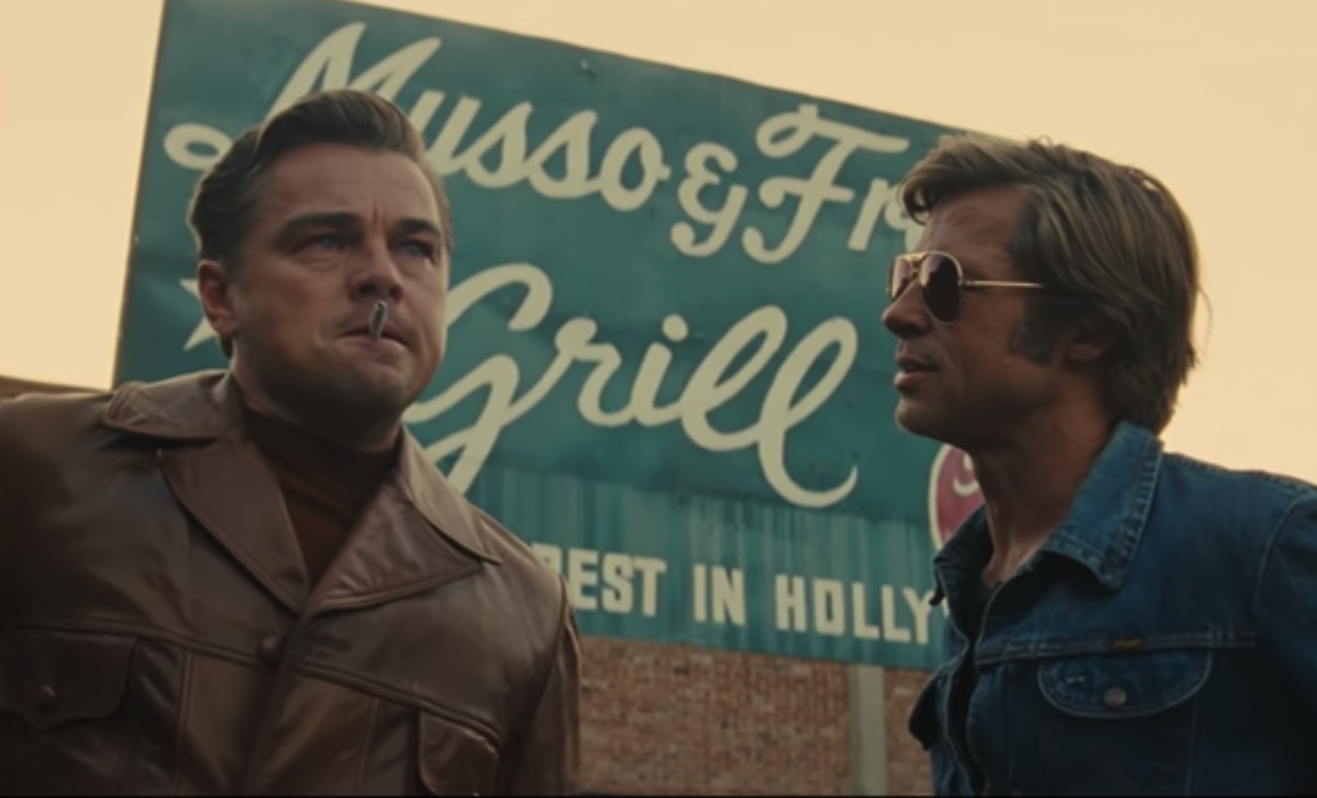It’s difficult to watch any Quentin Tarantino film and not dwell on how meticulously he stages death. His last three movies have ended with a hanging, a shooting followed by arson, and kamikaze arson that coincided with a machine gun assassination and a bombing. Ornate violence is, of course, as much the now-veteran director’s signature as chatty characters and tributes to cinema of the past. But there’s often a sincerity to his depictions of death. For as often as his movies lean into the pulpy satisfaction of the big, fat kill, he consistently emphasizes that death truly changes the people and places it impacts, usually offering them either genuine closure or a new beginning. In his films, death opens doors.
Tarantino’s newest epic Once Upon a Time…in Hollywood uses the real-life death of Sharon Tate, the most famous victim of the Manson Family Tate-Labianca murders, to structure a fantastical journey through late-‘60s Los Angeles. His fourth successive period piece, the film follows a fictionalized Sharon Tate (Margot Robbie), an aging actor named Rick Dalton (Leonardo DiCaprio), and his stuntman Cliff Booth (Brad Pitt) over the course of three days, leading up to August 8, the date of Tate’s murder. It sounds like trademark Tarantino, and in many ways it is—there’s an uber-violent climax, snappy dialog, and an obsessive attention to detail—but there’s a leisure to the direction that drifts away from his normal style and pacing. As the sprawling film loiters in Hollywood’s dusty back lots and worn film sets, moviemaking is portrayed as a sacred art. The fact that Tarantino chooses to focus on two cogs in the film industry machine who are blowhards in various stages of personal and professional decay gives his reverence for the industry a strange tension, as if he is skeptical of the idea of a rosy past but is still in love with the lie. Once Upon a Time is both in awe of the magic of filmmaking and apologetic about its costs, and that ambivalence undermines its thrills.
Before he veers into the murkier realm of fantasy, Tarantino first clearly establishes the facts. Hollywood is a company town and pay is unequal. Rick Dalton is an alcoholic television actor who never made his star turn on the big screen. We’re introduced to him at his modest career peak, on the set of Bounty Law, a Western that airs on NBC. Years later, he finds himself treading water in the industry: he picks up bit parts as villain of the week on various shows, but he is not in demand. Booth is even worse off. Unable to find regular work doing stunts even with Dalton’s blessing, Pitt’s character—chauffeur, maintenance man, and best friend—is its own fixture of Hollywood, the sort of employee-turned-confidant that underscores the particular isolation of celebrity. In a nod to his back-of-the-house status, Booth lives alone in a trailer behind a drive-in theater. Still, he seems content. He hasn’t made it big and never will, but he’s making due. Sharon Tate, by contrast, is on top. Newly married to Roman Polanski, who is fresh off of making Rosemary’s Baby, she’s not yet famous but is primed for stardom, and cruises the city with wide-eyed wonder.
Throughout the film, Tarantino skillfully extends and contracts the distance between these three characters, using them as foils for each other as well as the parts of the industry they represent. Tate is an ascending star, yet she lives next door to Dalton, who imagines he might be “one pool party” away from catching a break. A few hours after he says this, however, Tate and Polanski go to an actual pool party at the Playboy Mansion while Dalton stays home and practices lines for Lancer, a low-budget production he’ll be working on the next day. Dalton’s distance from that in-crowd feels permanent. He’s next door but miles away.
He’s still doing better than Booth, though, who drops Dalton off at the Lancer shoot and then spends the day doing repair work and driving around aimlessly. When he later ends up at the Spahn Ranch, a former Western set that’s become the home for Charles Manson’s “family,” it becomes clear how little he has to lose. Familiar with the ranch because he used to shoot there with Dalton, Booth insists on meeting the ranch’s owner George Spahn. Members of the Family stonewall him, but he doesn’t back down. When Booth finally meets Spahn, and Spahn doesn’t recognize Booth or care about his ordeal of getting past the Family in order to check on his well-being, Booth is unfazed. For Pitt’s character, it feels like destiny: Once upon a time in Hollywood, an old man was forgotten.
As the film creeps toward August 8, Booth’s extended encounter with the Family allows the mortal menace the group represents to become more concrete, but their inclusion in the film is ultimately a red herring. After all, death is in the air before Booth even reaches the Spahn Ranch. Stunt work is built on risk and presumed expendability, and the Westerns on which Booth and Dalton work brim with racialized murder and frontier justice. In fact, Booth is likely an actual murderer. One reason he can’t find work is because it’s rumored he killed his wife, a tidbit that we learn secondhand and is later dramatized in a flashback that omits her death, but feels less like hearsay as Booth starts nonchalantly bashing in women’s faces toward the film’s end.
More than anything, including the Manson murders, Dalton and Booth’s odd couple relationship is at the core of the film. At turns both charming and pathetic, their dysfunctional interdependence embodies the cooperative spirit of Hollywood that Tarantino admires. Dalton is self-centered and whiny; Booth is a stoic wiseguy. Their rapport plays out like an unedited podcast: Dalton despairs and broods and moans, and Booth listens and quips. Ostensibly, they are employer and employee, but they feel more like brothers. When Dalton gets married in Italy and spends so much money that he has to lay off Booth, Booth takes it in stride. As Pitt steals scene after scene with his aloof charisma, you can almost forget Booth probably killed his spouse, which feels like a uniquely Hollywood kind of revisionism: Once upon a time, a guy was so cool, he murdered his wife and got away with it.
 Outside of the Dalton and Booth story, however, there is plenty during the rest of Once Upon a Time’s three hours that fails to resonate. The film is structured around the assumption that the Sword of Democles is hovering over Tate’s head, but in a playful twist, she survives and the Family dies. It seems like it’s intended to be subversive, but it doesn’t clearly function as such. If it’s a dig at the Family and how silly and arbitrary their notoriety is, why even include them in the film at all? As written, they barely even feel threatening. Instead of preaching Helter Skelter, the Family of Once Upon a Time just comes across as stoned hippies. Tarantino cheekily toys with viewer expectations, keeping Charlie on the edge of the story, but that sidelining muddles what their violence represents. Also, if the goal is a reimagining of Tate’s tragic fate, why recreate her life in a way that remains defined by her death? Why not show us Tate on August 10 or August 28? As good of a reversal as it is within the narrative, Once Upon a Time… Sharon Tate Didn’t Die doesn’t feel like a particularly imaginative take on her legacy.
Outside of the Dalton and Booth story, however, there is plenty during the rest of Once Upon a Time’s three hours that fails to resonate. The film is structured around the assumption that the Sword of Democles is hovering over Tate’s head, but in a playful twist, she survives and the Family dies. It seems like it’s intended to be subversive, but it doesn’t clearly function as such. If it’s a dig at the Family and how silly and arbitrary their notoriety is, why even include them in the film at all? As written, they barely even feel threatening. Instead of preaching Helter Skelter, the Family of Once Upon a Time just comes across as stoned hippies. Tarantino cheekily toys with viewer expectations, keeping Charlie on the edge of the story, but that sidelining muddles what their violence represents. Also, if the goal is a reimagining of Tate’s tragic fate, why recreate her life in a way that remains defined by her death? Why not show us Tate on August 10 or August 28? As good of a reversal as it is within the narrative, Once Upon a Time… Sharon Tate Didn’t Die doesn’t feel like a particularly imaginative take on her legacy.
Tarantino’s nostalgic reanimation of hippie-era Hollywood lacks the substance needed to clarify his thematic intentions. He tries to brings Sunset Boulevard to life by stitching scenes together with vintage recordings of AM radio station KHJ—replete with ads and radio bumps—but the warmth of the era fails to come across. There are few people of color in this revival of Los Angeles, and the political tumult of the ‘60s is barely represented. The director has described the film as a “love letter” to this era, but it’s hard to discern what exactly he loves about this particular point in time beyond the films and their stars. Dalton and Booth’s struggles are entirely tethered to the movie industry rather than any larger cultural currents. In this way, Once Upon a Time feels a bit like Office Space for faded stars. Is that really all the Hollywood of Tarantino’s youth has to offer?
The best moments of the film are when he finds the points of connection across Hollywood’s social and professional strata, and insists the city is a home as much as a workplace. When Dalton has a cameo on the show FBI, for instance, he and Booth watch it together and admire the finished product. Viewing the episode in Dalton’s living room, they genuinely have fun. Elsewhere, Tate is tickled by the warm audience reaction to her comedic role in The Wrecking Crew, which she watches at a public theater, beaming behind a pair of oversized glasses, her feet propped up on the seat in front of her. While she is not recognized by the clerk at the ticket booth, she is visibly thrilled for her work to be appreciated by the public. Given how much her murder has defined her life historically, it’s delightful to see her brought to life for something so self-affirming.
It’s in these cozier moments where Once Upon a Time … in Hollywood feels like Quentin Tarantino attempting to redefine what “a Tarantino film” has signified for decades. It’s been ages since the primary characters in one of his movies were motivated by something more than vengeance and saw beyond death. Once Upon a Time ends with a gratuitous triple murder, of course, but it’s in self-defense. For Tarantino, it’s not exactly progress, but it’s something new.





